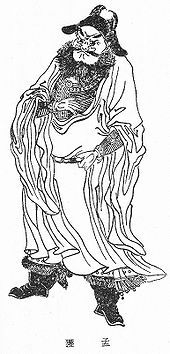- Meng Huo
-
Meng Huo Qing Dynasty illustration of Meng Huo Rebel leader of Nanzhong Names Simplified Chinese 孟获 Traditional Chinese 孟獲 Pinyin Mèng Huò This is a Chinese name; the family name is Meng.Meng Huo was popularly regarded as a local leader representing the gentries of the Nanzhong region during the Three Kingdoms era of Chinese history. When the emperor of Shu Han, Liu Bei, died, the local people of Nanzhong severed their ties with Shu Han, stating that there were three lords claiming to be the legitimate ruler of China and they "no longer knew whom should they pledge allegiance to"; in retaliation, Shu Han's chancellor, Zhuge Liang, launched a full invasion on the Nanzhong region, and successfully quelled the uprising. It was recorded in the Spring and Autumn Annal of Han and Jin Dynasty (漢晉春秋) and the Chronicles of Huayang that Zhuge had captured and let go of the local leader seven times, so the leader finally swore his allegiance to Shu Han.
The popular image of Meng Huo follows Luo Guanzhong's semi-fictitious novel Romance of the Three Kingdoms, where he is portrayed as a southern barbarian tribal leader. In the novel Meng Huo was married to a fictional Lady Zhurong, who claimed descent from the Chinese god of fire, Zhu Rong.
Contents
Contentions on historicity
According to Zhang Hualan's article, Discussion on Meng Huo, Meng was only a fictional character invented by later historians,[citation needed] noting that the word "Huo" (獲) means "captured" in Chinese. Modern historians like Huang Chengzhong also pointed out Zhang's view represents the majority of the academics,[citation needed] yet Huang himself believes Meng to be a real historical figure. The name Meng Huo first appeared in the Spring and Autumn Annal of Han and Jin Dynasty, written by Xi Zaochi (習鑿齒) of the Eastern Jin Dynasty, which the Liu Song Dynasty historian Pei Songzhi found unreliable at times.[1] However, the tale of Meng Huo is also mentioned in the Chronicles of Huayang, nearly contemporary to Xi's work, and Xi's passage regarding Meng Huo was included in Pei Songzhi's Annotated Records of the Three Kingdoms with no additional commentary.[2] The Song Dynasty historian Sima Guang, the leading compiler of definitive history Zizhi Tongjian, took Xi's records into his work. The Sichuan University professor Miao Yue analyzed Zhuge would not be able to release the leader if the latter was indeed captured. Tan Liangxiao, director of the Museum of Temple of the Marquis of Wu in Chengdu, also stated the "seven times freed" story to be "strange and unbelievable."[citation needed]
In fiction
- Extracts from Luo Guanzhong's historical novel Romance of the Three Kingdoms pertaining to Meng Huo:
- In the third year of Jianxing a bulletin came to Yi Province announcing, "Meng Huo has led 100,000 Nanman tribesmen across our borders to plunder the villages." (Chapter 87 - Paragraph 2)
- Despite protest from Court Conselor Wang Lian, Zhuge Liang leaves to lead five hundred thousand soldiers against the southern forces.
- The Shu forces were led by Zhuge Liang. Zhao Yun and Wei Yan were his generals, their lieutenants being Wang Ping and Zhang Yi.
- Meng Huo speaks to Zhuge Liang: "The whole of the riverlands once belonged to another. Your lord seized it by force and proclaimed himself emperor. My ancestors held these lands, which you have encroached upon so barbarically." (87-36)
- Zhuge Liang captures and frees Meng Huo: "I can catch him again with ease whenever I choose to. But pacification of the south requires that we subdue the hearts of the Nanman people." (88-1)
- During the conquest, Meng Huo was captured on seven different occasions, by Zhuge Liang. In addition, many Nanman generals and lieutenants were captured and treated with kindess. This caused many withdrawals and eventually the pacification of the south.
- Zhuge Liang: "I guessed the enemy would be looking for an ambush in the woods, so I set up decoy banners there to confuse them. There were never any troops. Next, I had Wei Yan lose a series of battles to strengthen their confidence... I ordered Ma Dai to deploy the black wagons in the valley - they had been loaded earlier with fire launchers called 'earth thunder', each containing nine missiles... We cut off the road and burned out the enemy..." (90-41)
- Finally, Meng Huo admits defeat: "Seven times captured, seven times freed! Such a thing has never happened! Though I stand beyond the range of imperial grace, I am not utterly ignorant of ritual, of what propriety and honor require. No, I am not so shameless!" He then stripped off one of his sleeves (a sign of swearing oath) and pledged: "By Chancellor's celestial might, the Southerners will never rebel again." (90-44)
Modern references
Meng Huo is featured as playable character in Koei's Dynasty Warriors and Warriors Orochi video game series.
See also
- List of people of the Three Kingdoms
- List of Dynasty Warriors characters
Notes
- ^ Pei Songzhi, Annotated Records of the Three Kingdoms. 28. Pei Songzhi accuses Xi Zaochi of anachronistically inserting quotations in the biography of Wang Ling, which is unrelated to the passage regarding Meng Huo. (‘如此言之类,皆前史所不载,而犹出习氏。且制言法体不似于昔,疑悉凿齿所自造者也?)
- ^ Pei Songzhi, Annotated Records of the Three Kingdoms. 35.
References
- Luo Guanzhong, translated by Moss Roberts (2004). Romance of the Three Kingdoms, University of California Press. ISBN 0-520-22503-1.
Prominent people of Shu Han Emperors Empresses Regents Advisors Generals Others Categories:- Shu Han generals
- Meng Huo and associates
Wikimedia Foundation. 2010.

